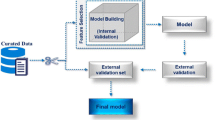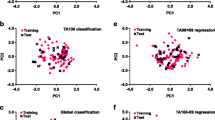Abstract
One of the approaches in the Knowledge Discovery in Databases (KDD) domain is Predictive Toxicology (PT). Its aim is to discover and represent the relationships between the chemical structure of chemical compounds and biological and toxicological processes. The challenges in real toxicology problems are big amount of the chemical descriptors and imperfect data (means noisy, redundant, incomplete, and irrelevant). The main goals in knowledge discovery field are to detect these undesirable proprieties and to eliminate or correct them. This supposes noise reduction, data cleaning and feature selection because the performance of the applied Machine Learning algorithms is strongly related with the quality of the used data. In this paper, we present some of the issues that can be performed for preparing data before the knowledge discovery process begin.
Preview
Unable to display preview. Download preview PDF.
Similar content being viewed by others
References
The Specialized Information Services Division of the National Library of Medicine, Information resources and services in toxicology, http://chem.sis.nlm.nih.gov/chemidplus/
Kira, K., Rendell, L.A.: A practical approach to feature selection. In: International Conference on machine learning, pp. 249–256. Morgan Kaufmann, San Francisco (1992)
Kononenko, I.: Estimating attributes: Analysis and Extension of Relief. In: Proc. of ECML, pp. 171–182. Springer, Heidelberg (1994)
Kononenko, I.: Evaluating the quality of the attributes. In: Advanced Course on Knowledge Technologies, ACAI 2005, Ljubljana (2005)
Myllymäki, P., Silander, T., Tirri, H., Uronen, P.: B-Course: A Web-Based Tool for Bayesian and Causal Data Analysis. International Journal on Artificial Intelligence Tools 11(3), 369–387 (2002), http://b-course.cs.helsinki.fi/obc/ref.html
Domingos, P., Pazzani, M.: Beyond Independence: Conditions for theoptimality of the simple bayeisan classifier. In: Proceeding of the Thirteenth ICML (1996)
Charles, E.: Naïve Bayesian Learning, Technical Report, University of California (1997)
Witten, I.H., Frank, E.: Data Mining: Practical Machine Learning Tools and Techniques with Java Implementations. Morgan Kaufmann Publishers, San Francisco (1999)
Jang, R.J.S.: ANFIS: Adaptive network-based fuzzy inference system. IEE Trans., Man and Cybernetics 23, 665–685 (1993)
Breiman, L., Friedman, J.H., Olshen, R.A., Stone, C.J.: Classification and regression trees. Wadsworth Inc., Belmont (1984)
Rish, I.: An empirical study of the naive Bayes classifier. In: IJCAI 2001 Workshop on Empirical Methods in Artificial Intelligence (2001)
Liang, H., Yan, Y.: Learning Naive Bayes Tree for Conditional Probability Estimation, CAI (2006)
TOPAR Project, http://www.topar.ro/homeEN.asp
Areej, S., Gongde, G., Daniel, N.: A Study on Applications of Machine Learning Techniques in Data Mining. In: 22nd BNCOD, UK (2005)
Neagu, D., Guo, G., Trundle, P., Cronin, M.: A Comparative Study of Machine Learning Algorithms Applied to Predictive Toxicology Data Mining. In: Proc. of SSCT&ETS (2005)
Pearl, J.: Bayesian Networks, Causal Inference and Knowledge Discovery, UCLA Cognitive Systems Laboratory, Technical Report (R-281) (March 2001)
Author information
Authors and Affiliations
Editor information
Rights and permissions
Copyright information
© 2008 Springer-Verlag Berlin Heidelberg
About this paper
Cite this paper
Cocu, A., Dumitriu, L., Craciun, M., Segal, C. (2008). A Hybrid Approach for Data Preprocessing in the QSAR Problem. In: Lovrek, I., Howlett, R.J., Jain, L.C. (eds) Knowledge-Based Intelligent Information and Engineering Systems. KES 2008. Lecture Notes in Computer Science(), vol 5177. Springer, Berlin, Heidelberg. https://doi.org/10.1007/978-3-540-85563-7_72
Download citation
DOI: https://doi.org/10.1007/978-3-540-85563-7_72
Publisher Name: Springer, Berlin, Heidelberg
Print ISBN: 978-3-540-85562-0
Online ISBN: 978-3-540-85563-7
eBook Packages: Computer ScienceComputer Science (R0)




